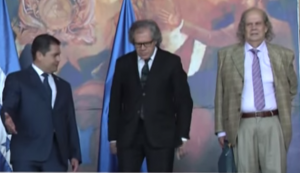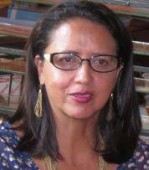John Biehl: A Manipulated Mediator Who Deepened the Crisis in Honduras
by Dina Meza Translated by: Katherine Wingfield-Dobbs / September 24, 2015 / No comments

President Hernández, OAS Secretary-General Almagro, and Head Negotiator Biehl meet in Tegulcigalpa. Photo via Youtube user: Juan Orlando Hernández.
The mediator failed to involve the Honduran people affected by injustice in dialogues with the President.
When the Organization of American States (OAS) and the United Nations (UN) announced that they would appoint facilitators for dialogue in Honduras, some viewed the news with suspicion. However, the majority hoped that the country had at last hit rock bottom and was about to begin its recovery.

- Honduras has one of the world’s highest murder rates. It is also one of the most dangerous countries to practice journalism, ranking 129th out of 180 in the 2014 World Press Freedom Index. Journalists are regularly threatened, attacked, and killed for their work. The Honduran government fails to punish those who use violence against reporters, essentially granting them impunity. This space will be dedicated to examining the lack of protection for Honduran journalists exercising their profession. Topics will include the use of state-sponsored advertising as a mechanism to reward or punish publications, and censorship and self-censorship as hindrances to democratic progress.

- Born in Cofradía, Honduras, Dina Meza has been recognized by PEN International, Amnesty International, Index on Censorship and Reporters without Borders for her work as a journalist and human rights advocate. Currently, Dina is the driving force behind the creation of Honduras PEN Centre. In 2013, she wrote “Reign of Terror,” an in-depth report on threats to Honduran journalists for Index on Censorship’s magazine. In 2014, she was named one of Reporters Without Borders’ “100 Heroes and Heroines of Information.”
That hope began to dissipate when Luís Almagro, the former Secretary General of OAS, and John Biehl, appointed by that same international organization, arrived in Honduras this August. Although they passed very close to the tents where the hunger strikers of the Indignados movement were located, they did not even stop to ask about their health, only meeting with President Juan Orlando Hernández. What a poor show!
However, it was believed that the haste of their visit caused this oversight, and that afterwards the facilitators would make space available to really listen to the people affected by injustice: those who are ignored by institutions, who exist where “law and order” is used against those who protest and demand their rights.
Although John Biehl met with 100 different organizations from civil society in the country, he only gave the people assembled, eager to be heard, five minutes apiece to express themselves. Meanwhile, he gave and continues to give President Hernández all the time in the world.
Is this the job of an OAS facilitator? I think that the officials came to pull Honduras’s leg. The demands of the outraged opposition, who have undertaken dozens of marches for social justice, have not been taken into account. Among other things, the opposition has called for the creation of the International Commission Against Impunity in Honduras (CICIH) to rule on the President of the Republic’s self-confessed diversion of Social Security funds for his political campaign¬.
John Biehl has clearly been manipulated. If Hondurans hadn’t heard Biehl speak in his own voice, we would have thought that what the corporate media—which incidentally uses media campaigns to distort Honduran reality—reported was lies and would not have believed it. But, on his departure from Honduras after his September visit, Biehl strongly criticized the people’s demands to the CICIH, “calling them the whims of a child who wants a toy car and is not given one.” These are shocking statements from someone who is supposedly mediating a deeply entrenched political crisis. The OAS should be putting their necks on the line to lay a foundation for peace and dialogue.
Biehl excelled in front of the cameras and microphones, adding other epithets against the political opposition. However, at no time did he criticize the audacity of President Juan Orlando Hernández, who spoke of dialogue whilst cracking down on journalists covering peaceful demonstrations asking for the CICIH, and those in the Indignados movement.
Biehl welcomed the government’s proposal to dismantle popular demand for the CICIH through the “Honduran Integral System to Combat Impunity and Corruption” (SIHCIC). This government-run plan puts the system in the hands of the same corrupt operators of justice who colluded with impunity, organized crime, and drug-traffickers, according to employees of the Public Ministry.
OAS’s actions have regrettably deepened the crisis in Honduras. Even though the vast majority of the population has not been consulted—only the President of the Republic—the government continues to implement the SIHCIC by force. They do this whether the people of Honduras—those who continue to march with their torches of indignation like it or not. Intolerance and a lack of willingness to hear both sides are failures of Biehl, the so-called “expert” from OAS.
This process gave insight to Hernández’s manipulation of the international presence in Honduras. Since their arrival in Tegucigalpa, he has made himself look presentable and he has maintained this façade to hide his poor conduct.
The people of Honduras no longer believe that rectification is possible. We already understand that hidden beneath the guise of peace and dialogue is a lack of dedication to convert this crisis into a process where talks are started, where the corrupt are punished, and where the CICIH is created so that justice can finally sees the light of day in Honduras.
Go mediation! What an ill-fated role! The saddest thing of all is that any hope for mediation vanished when the “facilitators” arrived in Honduras.




